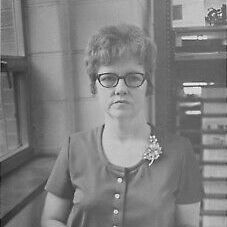Table of Contents
Pike Countians have long been proud to claim Lillie D. Chaffin as one of their own. Lillie was 37 and working as an elementary school teacher at Johns Creek when her first children’s book, A Garden is Good, was published in 1963. Meanwhile, she was gaining a reputation in another genre, with her poetry for adults appearing in hundreds of respected journals and anthologies across the nation. Four years and five books later, she was earning plaudits from the literary establishment.
Maybe it was from years of disciplining children, or the result of her own genius, but Lillie could be intimidating. She was hotly opinionated. If she were on a tirade, humbler folk best take shelter or else become targets for a barbed tongue. The compiler of this anthology remembers a luncheon at a local restaurant attended by Bruce Brown, a few members of his writing class at Pikeville College and Mrs. Chaffin. It was 1969 and all the men were wearing ties. Mine was a blue and yellow clip-on that had set me back around two dollars at Watson’s Department Store.
The soft drinks had barely hit the table when a small boy drifted away from his parents’ booth and approached Lillie with his tongue sticking out. “Get back to your seat right now, young man!” barked the author of “A Garden is Good.” After giving the miscreant a verbal blistering she fixed a withering eye upon each of the men seated about her. “Those ties! Look at those ties. When are you men ever going to free yourself from such bondage?”
Her neck feathers were still up when someone mentioned the works of Jesse Stuart. “Stuart, that fraud! A man who will compare a woman’s teeth to shelled corn is no writer.”
Lillie D. Chaffin was born February 1, 1925 to Kenis and Fairybelle Dorton at Varney, Kentucky. Growing up during the Depression, at a time when most children did not attend first grade until the age of six, if at all, Lillie insisted on starting at age four. She had her way and graduated eighth grade at age twelve. Her father, unemployed due to a railroad accident, could not afford to send her to high school. With the help of an understanding school superintendent she was able to attend Johns Creek High School in Pike County, but soon dropped out to marry Thomas Chaffin in 1942. She returned three years later and graduated valedictorian in 1947. Following graduation she earned a bachelor’s degree from Pikeville College and began what would become a twenty-eight year career as a teacher and librarian in the public school system.
Chaffin always knew she was born to be a teacher, but she felt something else, a burning deep within. As a young girl she had escaped to the rooftop of her home to write poems and daydream. Much later, while teaching in a county school, she took a serious interest in poetry and began mailing her best efforts to her principal for criticism. The principal was none other than the poet William McKinley Justice. The advice and encouragement she received from this remarkable man convinced her she had the makings of a poet. The first flames were kindled.
The young lady who almost didn’t finish high school became the author of seventeen books of poetry, fiction and nonfiction for juveniles and adults, mainly about her native Appalachia and its people. In 1969 her children’s book Bear Weather was named by the New York Times as one of the best juvenile books of the year.
John Henry McCoy (1971) received the annual Best Book for Young Readers Award given by the Child Study Association of America. In 1967 A Stone for Sisyphus, a poetry collection named for a character in Greek mythology, earned an award from the International Poetry Society. Eighth Day Thirteenth Moon, published by Pikeville College Press, was nominated for the Pulitzer Prize in 1974. In the same year the author would be appointed associate poet laureate of Kentucky by Governor Julian Carroll.
Epoch, the literary journal of Cornell University, recognized Chaffin as one of the top poets of America. Eastern Kentucky University, where she earned her masters, named her Teacher of the Year and Distinguished Alumnus. She was awarded an Honorary Doctorate of Letters Degree from both Eastern and Pikeville College.
In 1981, following the death of her husband Thomas, she moved to Clearwater, Florida. It was there where she met and married Vernon O. Kash, a doctor who died of cancer in 1985.
Although far from the Kentucky hills that had inspired so much of her work, she continued to write. In 1991, two years before her death, she co-edited her last book, God’s Plenty: Modern Kentucky Writers, a collection of short fiction, poetry and essays by 56 twentieth century Kentucky authors.
After being diagnosed with cancer, she moved to her son’s hometown of Huntington, West Virginia. She died October 27, 1993 at Cabell Huntington Hospital.
Lillie’s son Thomas spoke for all of us when he said: “The world has lost a great mind.”
Since 1996, in Chaffin’s honor, Morehead State University has offered the annual Thomas and Lillie D. Chaffin Award which offers a cash prize and recognizes outstanding Appalachian writers in all genres. George Ella Lyon, Michael McFee, Michael Chitwood and James R. Riley are among the recipients. Chaffin’s legacy lives on.
Might I add that Lillie Chaffin’s civilizing influence is alive and well on another level. Since the day of that meeting with Lillie and the gang in 1969, I have never worn a necktie.
Contributor – Gayle Compton
Tourism
They come in search of front porch washing machines, feuds, moonshine stills, Long Mile, Stinking Branch, Slaughter District, Putrid Hollow, Daisy Abner, Span Gussey and his kith and kin--the gaunt, unfriendly natives and potbellied children who slide like shadows between razor-back hills, barn dance frolics, ecstatic preachers battling unadulterated sin; they find what they're looking for, and much more. We lay it on. In season and scheduled right, they can hit such to-dos in some town every weekend: folk festivals, promoters find, are an ore to be exploited, and a little fun at the foreigner's expense perfectly legitimate. To recapture our past for a couple-a-days takes a year's coordinating. Preserving quaintness, we also take credit for proper weather, full-house motels, increased coffers on toll roads. Satisfied they found Appalachia, tourists go carrying off the woman's club, glossy printed at churns and quilts and wearing garb freshly antiqued. They miss lone-standing chimneys crowned with birds— landmarks of long-gone cabins and of love affairs between ourselves and the earth--and go, believing they find us in the well-staged parks. From Poetry II
Remnants
Imperceptibly, a leprechaun Flew over the earth last night and lost His tattered shirt, for I see our lawn, The meadow, and all the hills beyond Have gathered remnants and boast: Here a poplar sleeved in green, halfgold Belts of grass divide the blousing Puddles and a scanty skirt of bold Iris spears, a patch of leaves unfold Their symmetry. Today no housing Projects could keep me. I must gather Jade enough and vasing prove spring weather. From Contemporary Kentucky Poetry 1964
Stance
"Never spread your legs except in your own bedroom," Mama cautioned. "Never sit and do a long legged dance as men'll think you're working yourself up for them, and don't stick out your tongue or your chest. Ladies never beg attention." I walked about knock-kneed, hump-backed, dry lipped, now and then wishing the message would move out or over long enough and far enough that I might do a natural thing or two. From Kentucky Poetry Review Spring 1986
Old-Timer to Grandchild
And so our kinfolks let themselves be sweet-talked into believing that things would be the same. They let some Philadelphia lawyers tell them they could sell the yoke and keep the egg, and with that few cents they built a room onto the house or somesuch. And now the yoke owners are claiming their gold, and squashing the shell and letting it fall howsumever it falls. Let folks talk about our backward ways. I like it. If forward's what's been coming in right here lately, I'd go into backup if I could. Back up to the little creeks with fish in them, the trees with birds, the caves with animals, the air clean and smelling of hay and apples. If forward's now, then I feel sorrow for the ones who'll never know. But you will remember a little bit. You tell them birds do fly low before a storm. From Mucked 1977
Symbiosis
The child who once magnified my body's special, dark processing room, who absorbed his substance from my chemistry, now is his own-- would wrench himself from affection's hold. Let him be free. I have been what I must--brief room and board-- hostess to a growing miracle. I will be what I can. Beyond the slit in a box-house, he finds distant hills, their leaves aquiver-- resting on hills, a bluewhite sky in motion, Turning to larger holes, the boy can see, pasturing there, animals he has never seen and great ships riding on an ocean. I too look upon hills and skies, know how but one small turn can change a view while making sheep and ships from clumps of rain, that gulfs of age and space are not too great for spanning and wish on first stars again. Absorbed in the sudden twitch of fishline, he said, "See, I've caught the sun." The wiggle-leap was sun centered. Today he knows however briefly suns are hooked, they belong always to that fisherman. From God's Plenty: Modern Kentucky Writers





